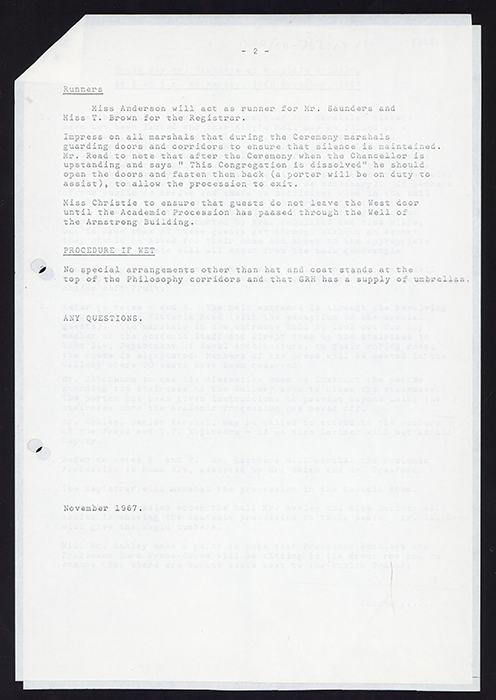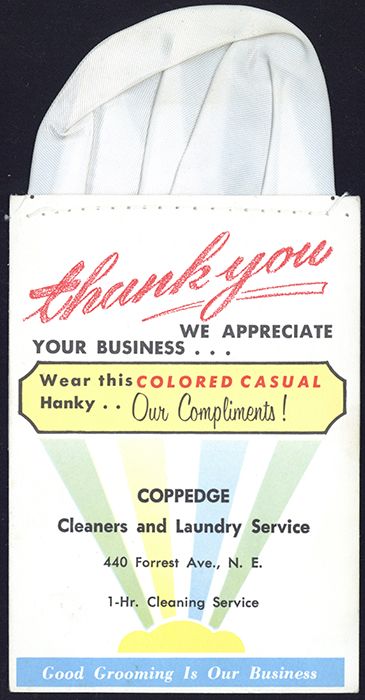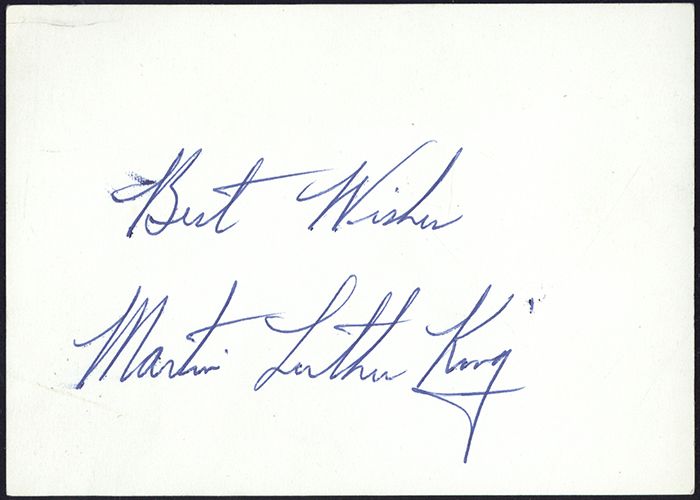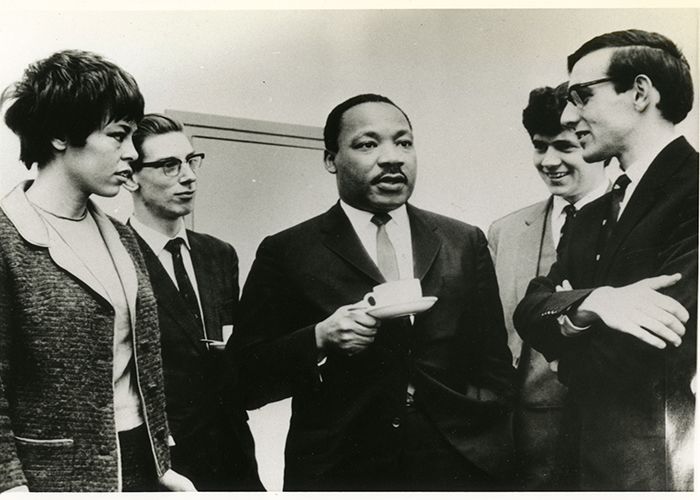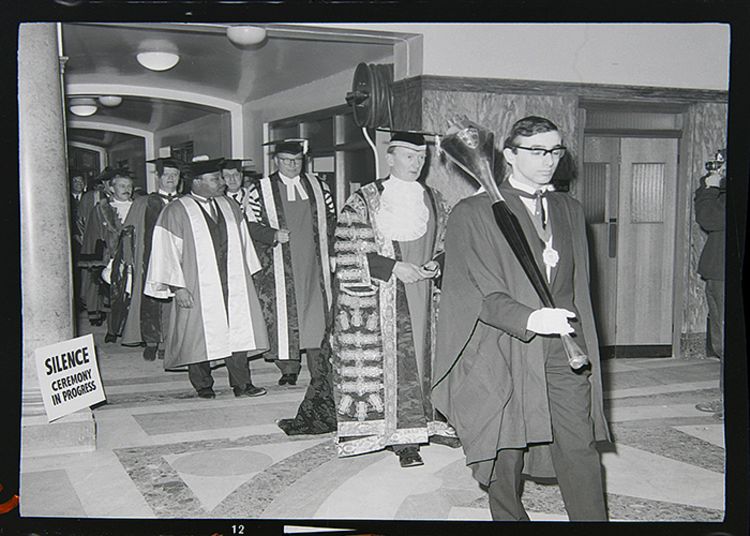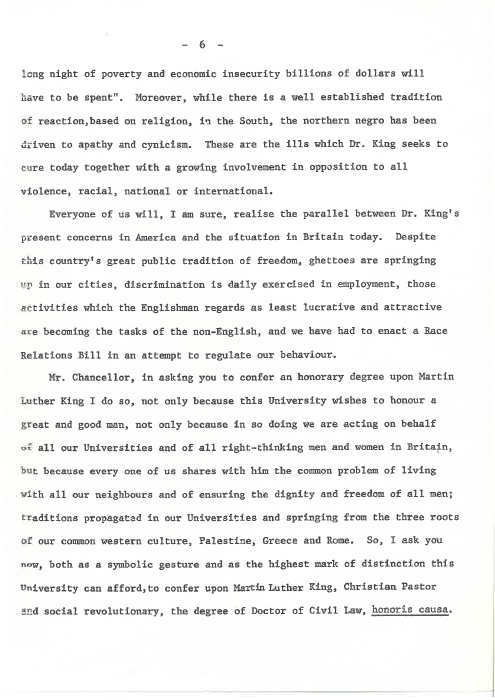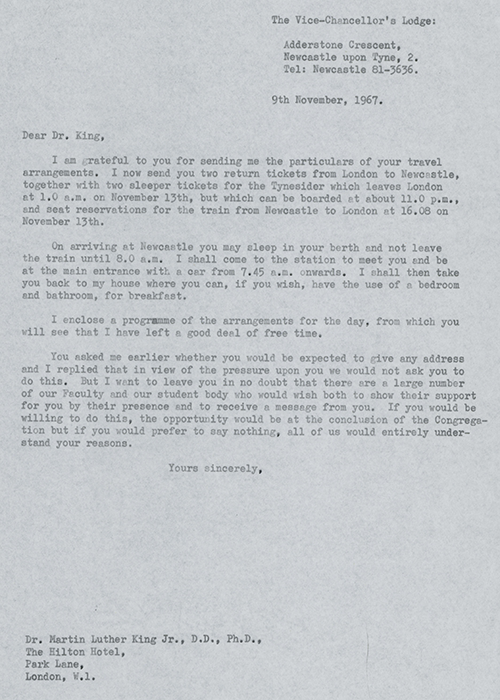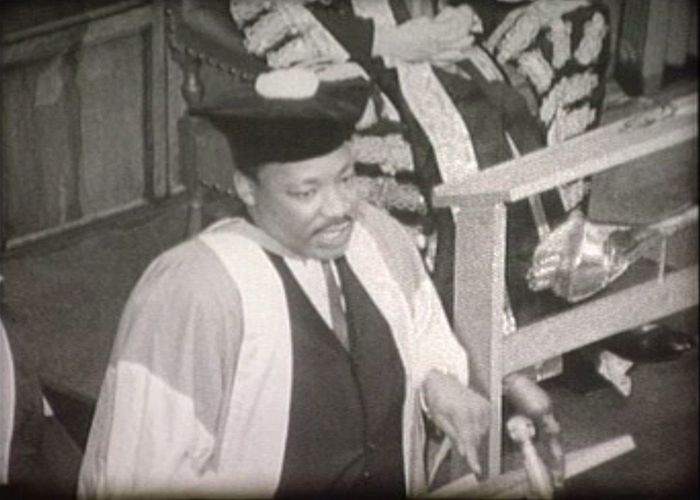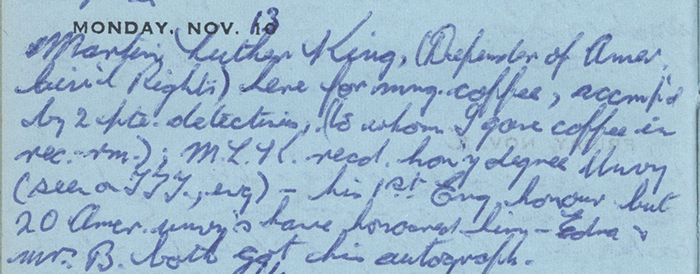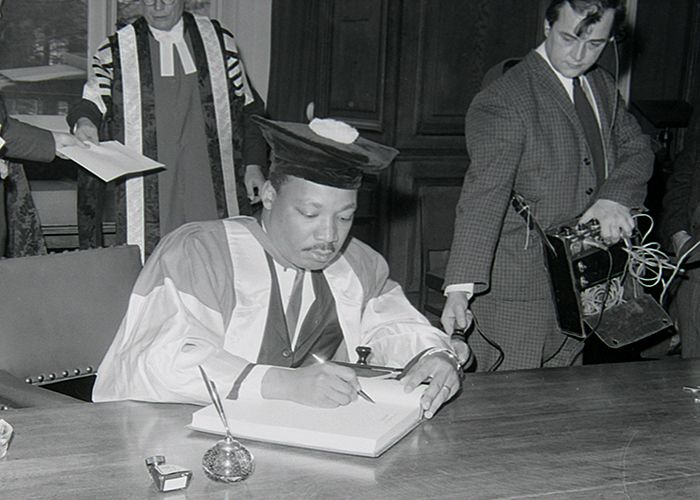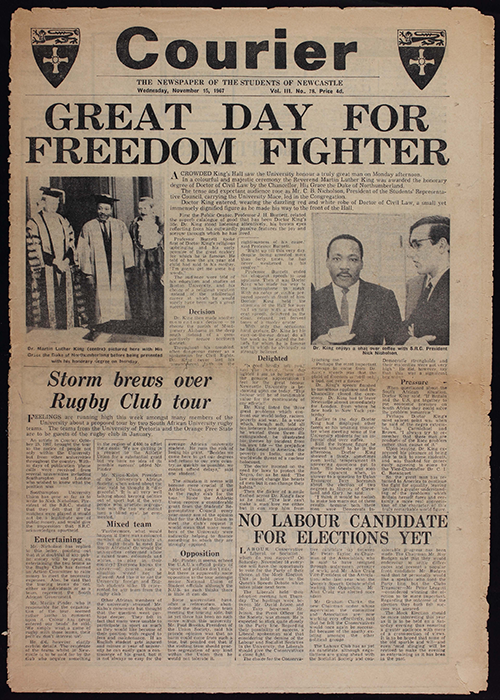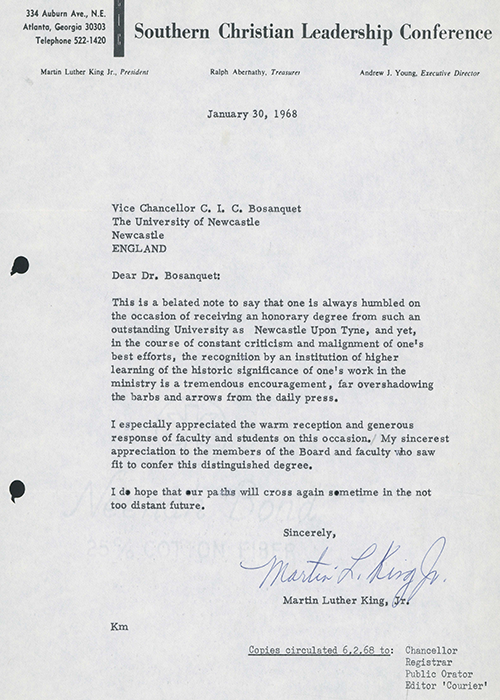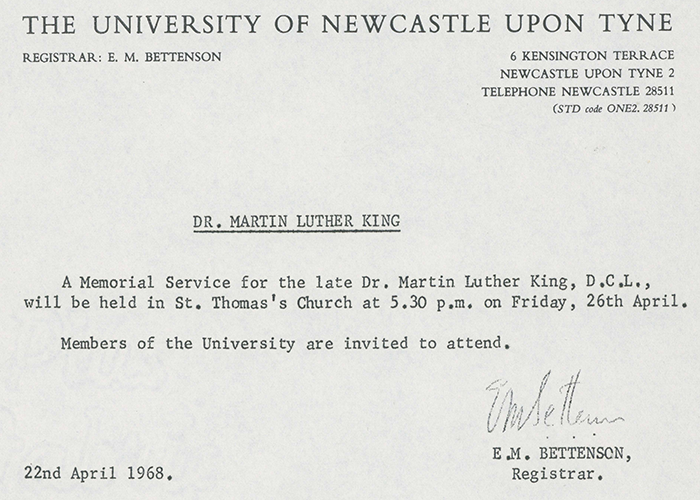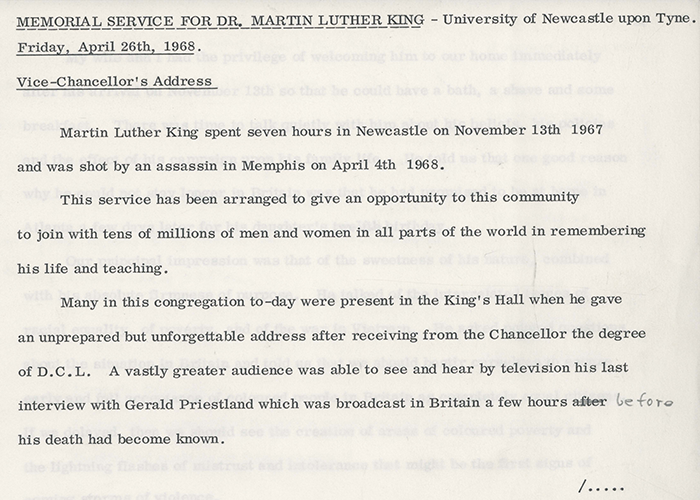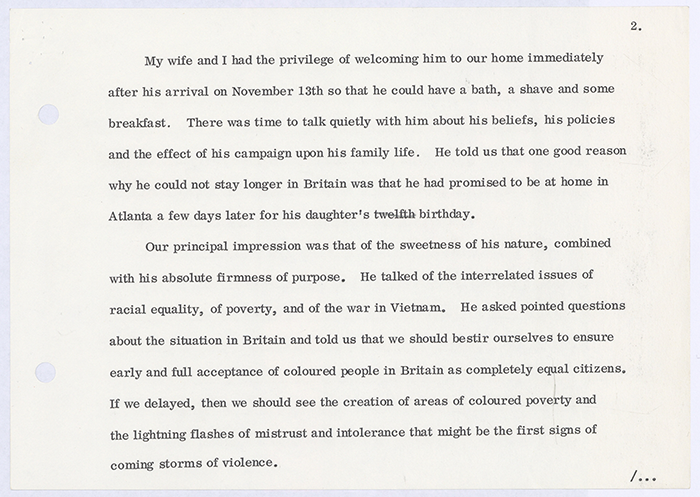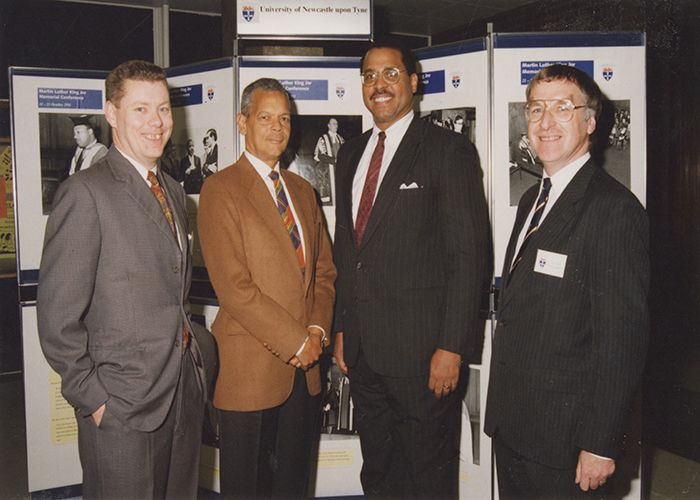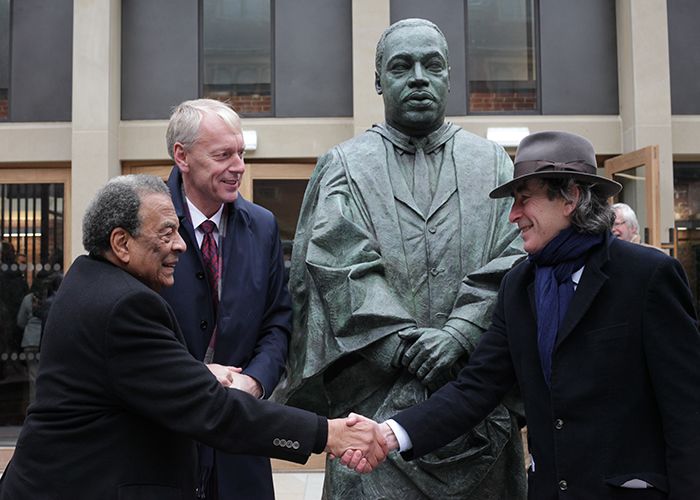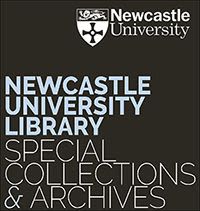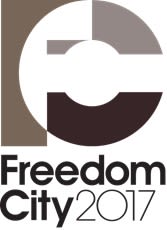Martin Luther King
at Newcastle University
This digital exhibition tells the story of Dr Martin Luther King Jr. receiving an honorary degree at Newcastle University in November 1967 using original photographs and documents from the University Archives. Created by Newcastle University Library's Special Collections & Archives, based on an exhibition co-curated with Professor Brian Ward, and supported by Freedom City 2017.
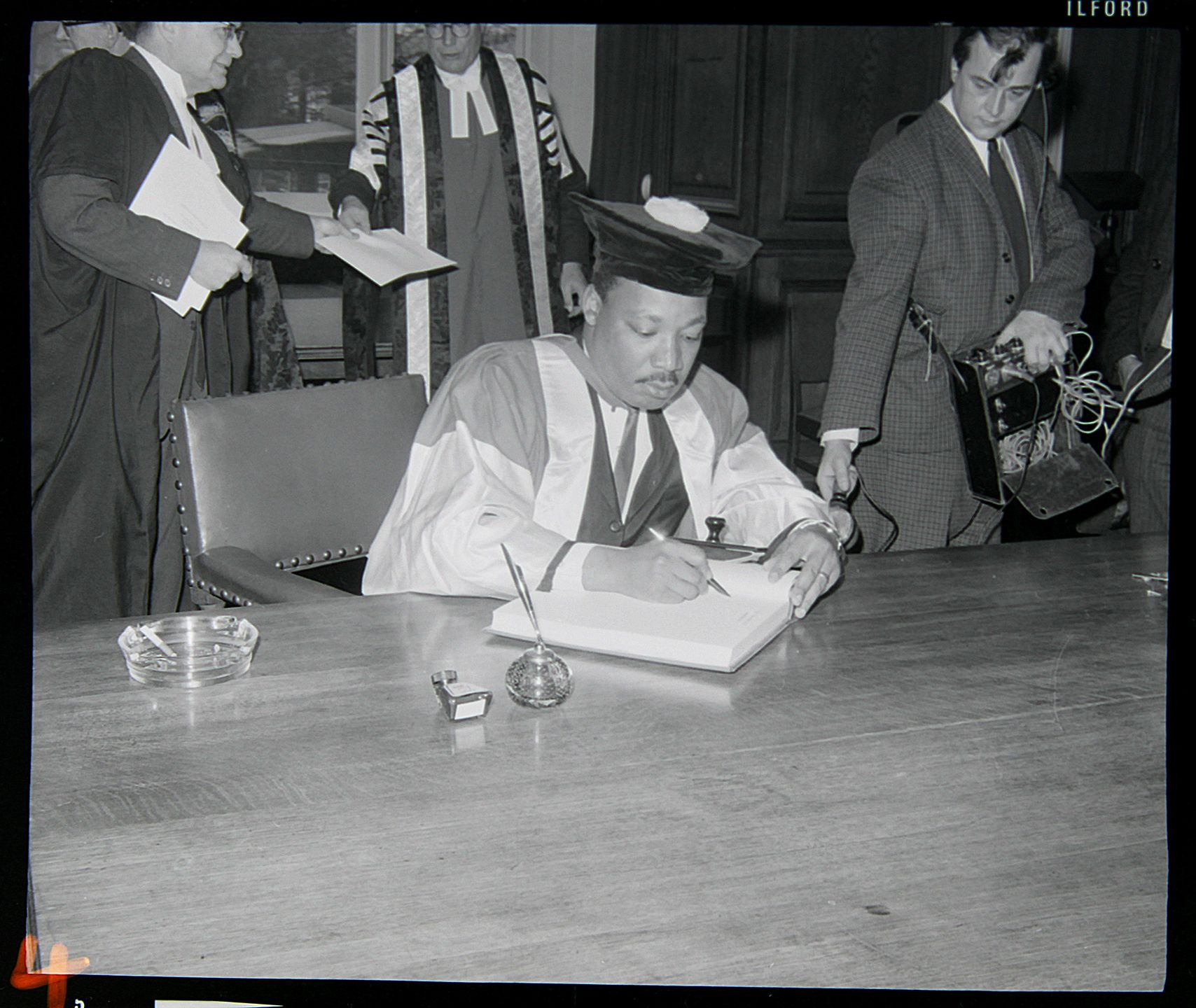
The Invitation

When Martin Luther King visited Newcastle to receive an Honorary Doctorate in Civil Law from Newcastle University, it was the culmination of more than a year of planning involving the University, King, and his staff at the Southern Christian Leadership Conference headquarters in Atlanta. On November 13, 1967 Newcastle University became the only British institution to award King an Honorary Degree - and Newcastle became the only place in Britain outside London that King ever visited.
Martin Luther King was first nominated for an Honorary Doctorate in Civil Law by Lord Wynne-Jones, a Labour Party peer and Professor of Chemistry at Newcastle University. The University’s Honorary Degrees Committee officially ratified the nomination on November 3, 1966.
[Lord] Wynne-Jones, letter to E.M. Bettenson, 2 October 1966 (University Archives, NUA/00-7621/4/30)
[Lord] Wynne-Jones, letter to E.M. Bettenson, 2 October 1966 (University Archives, NUA/00-7621/4/30)
University Registrar Ernest Bettenson formally wrote to King inviting him to Newcastle to accept his honorary doctorate at the regular May congregation.
E.M. Bettenson, letter to M.L. King, 14 December 1966 (University Archives, NUA/00-7621/1/44)
E.M. Bettenson, letter to M.L. King, 14 December 1966 (University Archives, NUA/00-7621/1/44)
The invitation to King was part of a strategy developed by Newcastle University’s first Vice- Chancellor, Charles Bosanquet, to use honorary degrees to publicise the University’s mission and values to the general public. A visit from a renowned international figure such as King would simultaneously raise the public profile of a University that had only attained independent status in 1963 and fulfill what Bosanquet called its ‘corporate responsibility’ to engage with the great social issues of the day.
Bettenson’s initial letters to King arrived while the civil rights leader was in the Caribbean working on his book Where Do We Go From Here? It was not until 23rd February, 1967 that King telegrammed to accept Newcastle’s invitation, although King’s hectic work schedule meant that he was unable to visit in May as originally planned.
Martin Luther King, telegram to E.M. Bettenson, 23 February 1967 (University Archives, NUA/00-7621/1/36)
Martin Luther King, telegram to E.M. Bettenson, 23 February 1967 (University Archives, NUA/00-7621/1/36)
On 8th March, 1967, the University issued a Press Release announcing, among other things, that King would come to campus to receive an Honorary Doctorate at a special congregation arranged for 13th November, 1967.
G. Ashley (Assistant Registrar), "Press Release," 8 March 1967 (University Archives, NUA/00-7621/2/42)
G. Ashley (Assistant Registrar), "Press Release," 8 March 1967 (University Archives, NUA/00-7621/2/42)
However, not everything went smoothly during the preparations for the visit. On 30th October 30, 1967, King was jailed in Alabama, just two weeks before the special degree congregation was scheduled. King was jailed on contempt of court charges relating to the Spring 1963 civil rights demonstrations in Birmingham.
Concerned, the Vice-Chancellor telegrammed to ask if he would still be able to travel to Newcastle.
C.I.C. Bosanquet, text of telegram to Dora McDonald, 1 November 1967 (University Archives, NUA/00-7621/1/28)
C.I.C. Bosanquet, text of telegram to Dora McDonald, 1 November 1967 (University Archives, NUA/00-7621/1/28)
A 1st November telegram from King’s secretary Dora McDonald confirmed that he would be able to attend. However, despite Dora McDonald’s reassurances, this letter from the Duke of Northumberland, who as Chancellor of the University was to preside over the Ceremony, shows that there were still grave concerns about whether King would make it to Newcastle...
"...assuming that Dr. King has been released from gaol!"
Duke of Northumberland, letter to E.M. Bettenson, 7 November 1967 (University Archives, NUA/00-7621/1/9)
Duke of Northumberland, letter to E.M. Bettenson, 7 November 1967 (University Archives, NUA/00-7621/1/9)
(Background image: Photograph of Martin Luther King with Vice-Chancellor Bosanquet, 13 November 1967 (University Archives, NUA/052589-1)
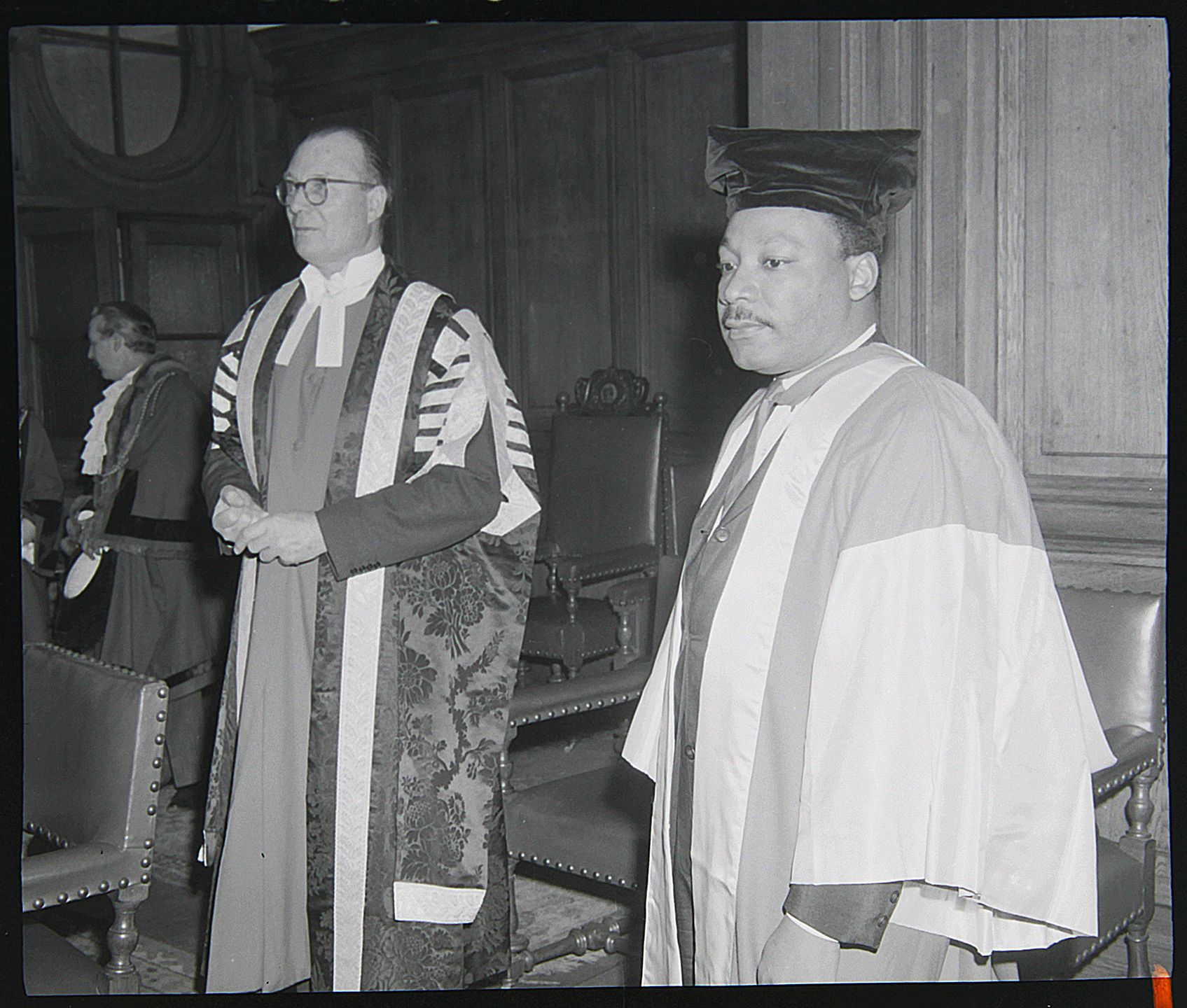
The Visit

After flying overnight from Chicago, Martin Luther King and his friend and fellow civil rights activist Andrew Young arrived in London early on Sunday, 12th November. At 1:00 am on Monday, 13th November, they caught the Tynesider sleeper train from Kings Cross, arriving at Newcastle Central Station shortly before 6:00 am. They stayed in their compartment until 8:00 am when they were taken to the Vice Chancellor’s home on Adderstone Crescent to have breakfast and freshen up before heading to the University.
Chief Clerk George Howe’s preparations for King’s visit included security arrangements. In this briefing document we see the meticulous nature of his preparations. He also explains that Mrs. Kell, a University administrator, would be on duty in the Gallery of the King’s Hall, from where she could ‘keep an eye open for the undesirable characters with toilet rolls and/or soft fruit'!
[George Howe], Page 1 of notes for Mr. Saunders at Marchals briefing at 1.45pm on Monday 13th November 1967, undated (University Archives, NUA/00-7621/2/19)
[George Howe], Page 1 of notes for Mr. Saunders at Marchals briefing at 1.45pm on Monday 13th November 1967, undated (University Archives, NUA/00-7621/2/19)
[George Howe], Page 2 of notes for Mr. Saunders at Marchals briefing at 1.45pm on Monday 13th November 1967, undated (University Archives, NUA/00-7621/2/19)
[George Howe], Page 2 of notes for Mr. Saunders at Marchals briefing at 1.45pm on Monday 13th November 1967, undated (University Archives, NUA/00-7621/2/19)
Edna and Laurence Kane worked for Vice-Chancellor Charles Bosanquet and lived at his Adderstone Crescent residence, where they met King and Young. King signed an autograph for Edna Kane and made her a present of this dress handkerchief, which had been in the top pocket of his suit jacket, as a gesture of thanks for the hospitality he and Young had enjoyed before heading to campus.
Martin Luther King’s handkerchief given to Edna Kane during his visit to Newcastle University. (Courtesy of Peter Kane)
Martin Luther King’s handkerchief given to Edna Kane during his visit to Newcastle University. (Courtesy of Peter Kane)
Autograph card given to Edna Kane by Martin Luther King during his visit to Newcastle University. (Courtesy of Peter Kane)
Autograph card given to Edna Kane by Martin Luther King during his visit to Newcastle University. (Courtesy of Peter Kane)
On campus, the schedule was tightly packed: there was an informal coffee morning with students; a sherry reception with staff and University Senators; a buffet lunch and a snatched conversation with the local press.
Among the Newcastle students who met with King and Young over coffee were (left) Meredyth Bell (née Patton), Deputy President of the Students’ Representative Council,and (right) C.B. ‘Nick’ Nicholson, President of the Students’ Representative Council.
Martin Luther King and students at coffee morning (University Archives, NUA/05289)
Martin Luther King and students at coffee morning (University Archives, NUA/05289)
At 2.30pm, the Honorary Degree ceremony took place in the King’s Hall of the University’s Armstrong Building. C.B. ‘Nick’ Nicholson carried the ceremonial mace and led the academic procession into the King’s Hall, followed by the Duke of Northumberland, Martin Luther King and Vice-Chancellor Charles Bosanquet.
Martin Luther King Degree Procession with Nicholson (University Archives, NUA/052589-14)
Martin Luther King Degree Procession with Nicholson (University Archives, NUA/052589-14)
J.H.Burnett, the University’s Public Orator, formally presented Martin Luther King for his Honorary Degree, delivering an address in which he stated that
"this University wishes to honour a great and good man..."
Final page of the transcript of the speech delivered by the University’s Public Orator J.H. Burnett. (NUA/00-7621/2/7)
Final page of the transcript of the speech delivered by the University’s Public Orator J.H. Burnett. (NUA/00-7621/2/7)
Once the formalities were over, King and Young were whisked away to Central Station. Less than eleven hours after they had pulled into Newcastle, the two men were travelling back to London on the 16:08 train. The following day, they returned to the U.S.
(Background image: Detail from a photograph of Martin Luther King Degree Procession with Nicholson, 1967 (University Archives, NUA/052589-14)
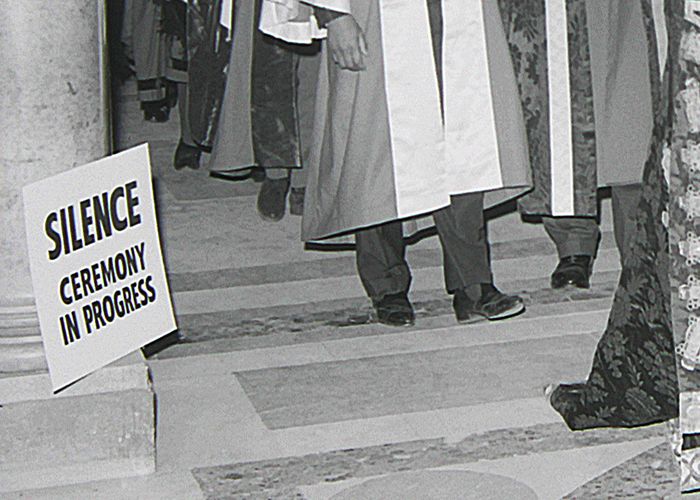
The Speech

At the end of the Degree Ceremony, King delivered a powerful and unscripted speech in which he linked the African American freedom struggle to developments in contemporary British race relations and issued a call for all people of goodwill to confront the global challenges of war, poverty and racism. He also spoke of how the fate of all the peoples of the world were ‘tied together in an inextricable network of mutuality’ and his faith that, in the words of Old Testament prophet Amos, one day ‘all over the world justice will roll down like waters and righteousness like a mighty stream.’
The correspondence between the University and King’s staff indicated that King was neither required, nor expected, to give a speech in Newcastle. However, as the day of his visit neared, Vice-Chancellor Bosanquet assured King of how thrilled the University community would be if he did feel moved to say a few words.
C.I.C. Bosanquet, letter to Martin Luther King, November 9, 1967 (Newcastle University Archives, NUA/00-7621/3/34)
C.I.C. Bosanquet, letter to Martin Luther King, November 9, 1967 (Newcastle University Archives, NUA/00-7621/3/34)
King's speech was a marvelous example of his skills as a public orator, drawing on his training as a Baptist minister and his experience of more than a decade in the media spotlight to craft a speech that perfectly fitted the occasion.
In his speech King emphasised,
"the three urgent and indeed great problems that we face not only in the United States of America but all over the world today… the problem of racism, the problem of poverty and the problem of war."
Still of Martin Luther King delivering his speech, taken from the original 1967 film footage of the ceremony (courtesy of the North East Film Archive)
Still of Martin Luther King delivering his speech, taken from the original 1967 film footage of the ceremony (courtesy of the North East Film Archive)
Because King was not expected to speak, the University had made no provision to record his remarks.
But Laurence Kane’s diary entry for 13th November, 1967 notes that the Ceremony was covered on local television. A report aired on Tyne Tees Television’s 6.05 magazine programme that evening.
Laurence Kane’s diary entry for 13 November 1967 [Courtesy of Peter Kane]
Laurence Kane’s diary entry for 13 November 1967 [Courtesy of Peter Kane]
Photographs like the one below, showing a journalist with a tape recorder next to King, alerted historian Brian Ward to the possibility that there might be a recording of King's Newcastle speech. In 1992, Ward identified among the University Archives a film of some of the academic procession, a portion of the remarks by the University’s Public Orator, and about 8 minutes of King’s remarks.
Martin Luther King signing the University's visitors' book, 13 November 1967 (University Archives, NUA/052589-5)
Martin Luther King signing the University's visitors' book, 13 November 1967 (University Archives, NUA/052589-5)
Background image: Martin Luther King waiting at the front of the degree ceremony to accept his honorary degree, 13 November 1967 (University Archives, NUA/052589-11)
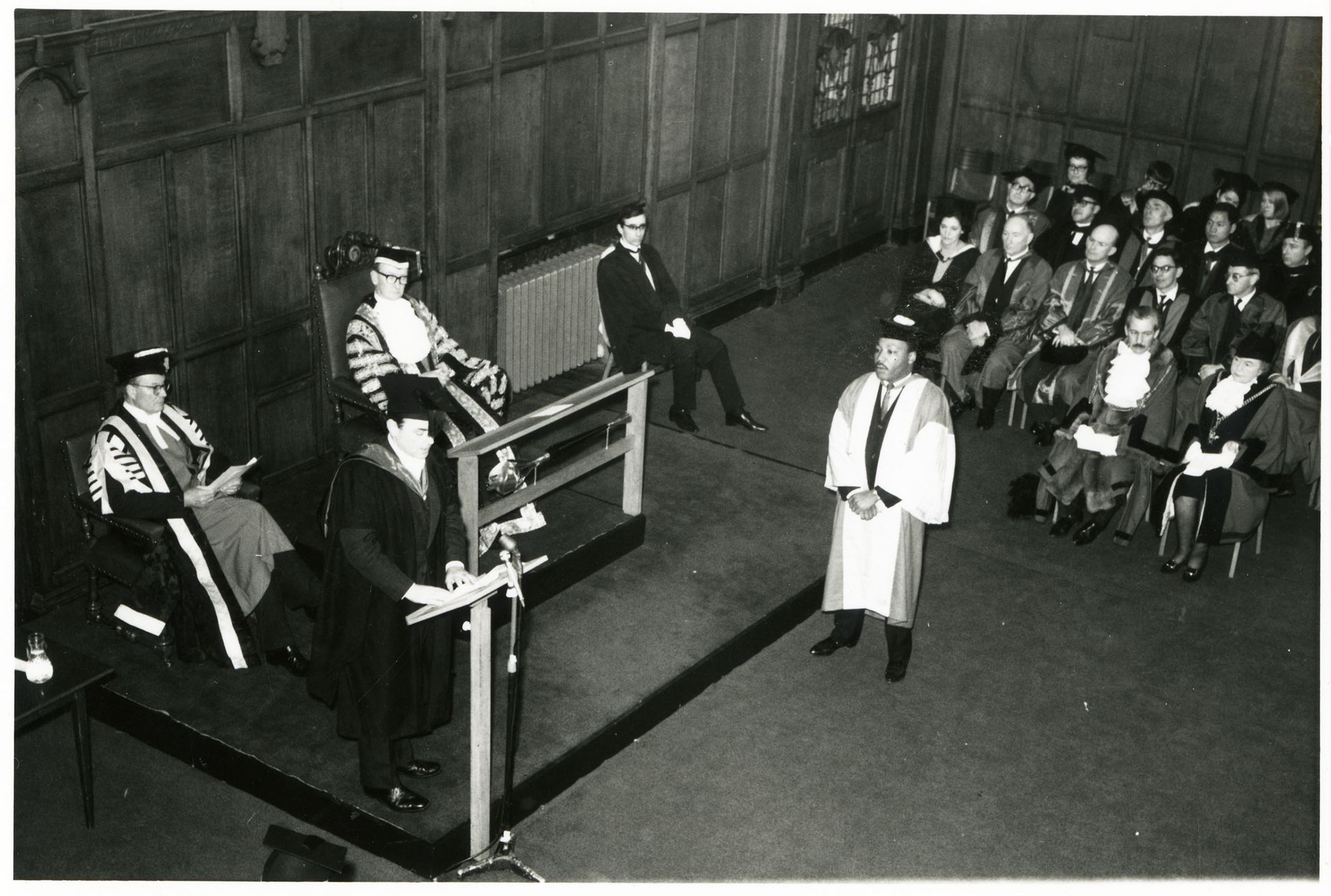
Reception, Aftermath & Impact

King’s Newcastle visit was widely reported in the local and national press and had a profound impact on all those who met with him personally or heard him speak in the King’s Hall. Paul Barry, who worked on the Courier student newspaper and took some of the best informal photographs of the day, recalled ‘When he did the ceremony and gave his speech the atmosphere was electric.’ Barry responded immediately to King’s call ‘for all men of good will to work passionately and unrelentingly to get rid of racial injustice, whether it exists in the United States of America, whether it exists in England, or whether it exists in South Africa,’ by joining the anti-apartheid movement
King’s visit to Newcastle was celebrated in the Courier, the newspaper of Newcastle students.
'Great Day for Freedom Fighter," Courier, 15 November 1967, p.1 (University Archives, 13/4/1)
'Great Day for Freedom Fighter," Courier, 15 November 1967, p.1 (University Archives, 13/4/1)
Paul Barry, who worked on the Courier and took some of the best informal photographs of the day, recalled ‘When he did the ceremony and gave his speech the atmosphere was electric.’ Barry responded immediately to King’s call "for all men of good will to work passionately and unrelentingly to get rid of racial injustice, whether it exists in the United States of America, whether it exists in England, or whether it exists in South Africa," by joining the anti-apartheid movement.
King’s trip prompted comment in the Houses of Parliament, on the subjects of immigration, race relation and the integration of cultures and communities (see David Winnick and Sir Cyril Osborne, House of Commons Debate, 15 November, 1967, Hansard, v. 754, pp.519-520). Heated debates raged between those who wanted an end to immigration from what in the 1960s was euphemistically known as the ‘New’ (as in non-white) Commonwealth and those who wanted greater legal protection for the rights of Britain’s racial minorities.
On 30th January, 1968, Martin Luther King wrote a heartfelt letter of thanks to Vice-Chancellor Charles Bosanquet, explaining how much he valued his award from the University and carrying particular poignancy for his assertion that,
"I do hope that our paths will cross again sometime in the not too distant future"
because, within only a few months of writing, Dr King would tragically be assassinated.
Martin Luther King, letter to C.I.C. Bosanquet, 30 January 1968 (University Archives, NUA/00-7621/3/41)
Martin Luther King, letter to C.I.C. Bosanquet, 30 January 1968 (University Archives, NUA/00-7621/3/41)
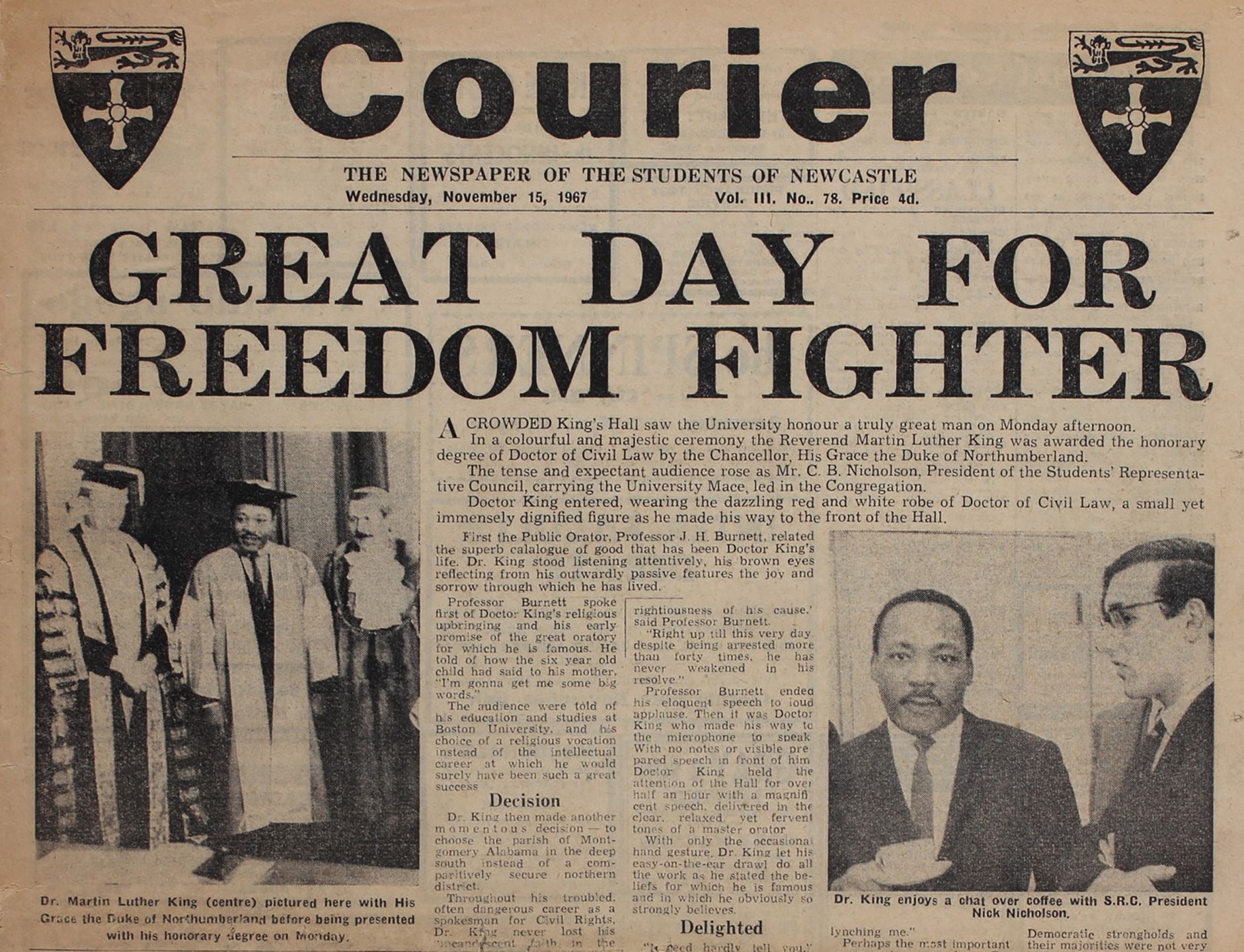
Assassination & Commemorations

On April 4, 1968, Martin Luther King was shot dead in Memphis. Shock waves reverberated around the region and the Newcastle press gave remarkably extensive coverage to the murder, the riots in the United States and the hunt for King’s killer, that ended with the arrest of James Earl Ray in London and his trial and conviction. Meanwhile, Newcastle University which he had visited just five months previously, organised a Memorial Service and contemplated appropriate ways to honour King’s visit and curate his legacy.
Following the news of King's assassination, Ernest Bettenson announced that Newcastle University ‘deeply deplored’ the killing and that ‘we are flying our flag at half-mast to show our deepest regret and sympathy for Dr. King’s family, who have suffered terribly in the course of his career.’
E.M. Bettenson, "Dr. Martin Luther King," announcement, 22 April, 1968 (University Archives, NUA/00-7621/3/21)
E.M. Bettenson, "Dr. Martin Luther King," announcement, 22 April, 1968 (University Archives, NUA/00-7621/3/21)
Vice-Chancellor Charles Bosanquet had established a good rapport with Martin Luther King in Newcastle and gave a moving eulogy at King’s Memorial Service in St. Thomas’s Church, Haymarket, on 26th April, 1968.
Charles Bosanquet, Page 1 from his Address at the Memorial Service for Dr. Martin Luther King, 26 April, 1968 (University Archives, NUA/00-7621/3/4)
Charles Bosanquet, Page 1 from his Address at the Memorial Service for Dr. Martin Luther King, 26 April, 1968 (University Archives, NUA/00-7621/3/4)
Charles Bosanquet, Page 2 from his Address at the Memorial Service for Dr. Martin Luther King, 26 April, 1968 (University Archives, NUA/00-7621/3/4)
Charles Bosanquet, Page 2 from his Address at the Memorial Service for Dr. Martin Luther King, 26 April, 1968 (University Archives, NUA/00-7621/3/4)
Laurence Kane’s diary entry for Friday, 26th April, 1968 shows that he was among those who attended the Memorial Service for King that day.
Laurence Kane’s diary entry for 26 April 1968 [Courtesy of Peter Kane]
Laurence Kane’s diary entry for 26 April 1968 [Courtesy of Peter Kane]
Newcastle University went on to inaugurate a sporadic series of Martin Luther King Memorial Lectures, the first of which was delivered on 12th October 1972, when Trevor Huddleston, Bishop of Stepney, spoke on ‘Race Relations in a Hungry World.’
In the 1990s, two memorial conferences at Newcastle University revived memories of King's visit to Newcastle through a mixture of academic and public cultural events, and spawned important research into King’s life and the history of the civil rights movement.
Photograph of Brian Ward, civil rights veteran Julian Bond, former Mayor of Cincinnati J. Kenneth Blackwell and the Dean of the Faculty of Arts at Newcastle University Jeremy Patterson at the 1993 Martin Luther King Memorial Conference (University Archives, NUA/00-7621).
Photograph of Brian Ward, civil rights veteran Julian Bond, former Mayor of Cincinnati J. Kenneth Blackwell and the Dean of the Faculty of Arts at Newcastle University Jeremy Patterson at the 1993 Martin Luther King Memorial Conference (University Archives, NUA/00-7621).
In 2017, to mark the 50th Anniversary of Dr. Martin Luther King Jr.'s visit to Newcastle to accept his honorary degree, a statue of Dr. King was unveiled at Newcastle University. It stands in the King's Quad, a newly created courtyard next to King's Hall, the setting for King's honorary degree ceremony 50 years ago. The statue will become the focal point of a new procession route that students at the University will take at the end of their graduation ceremony.
(left to right) Ambassador Andrew Young, Vice Chancellor and President Professor Chris Day and sculptor Nigel Bonham.
(left to right) Ambassador Andrew Young, Vice Chancellor and President Professor Chris Day and sculptor Nigel Bonham.
"This statue is a lasting tribute to the values that Dr King stood for and a unique record of one of the most significant moments in the University’s history".
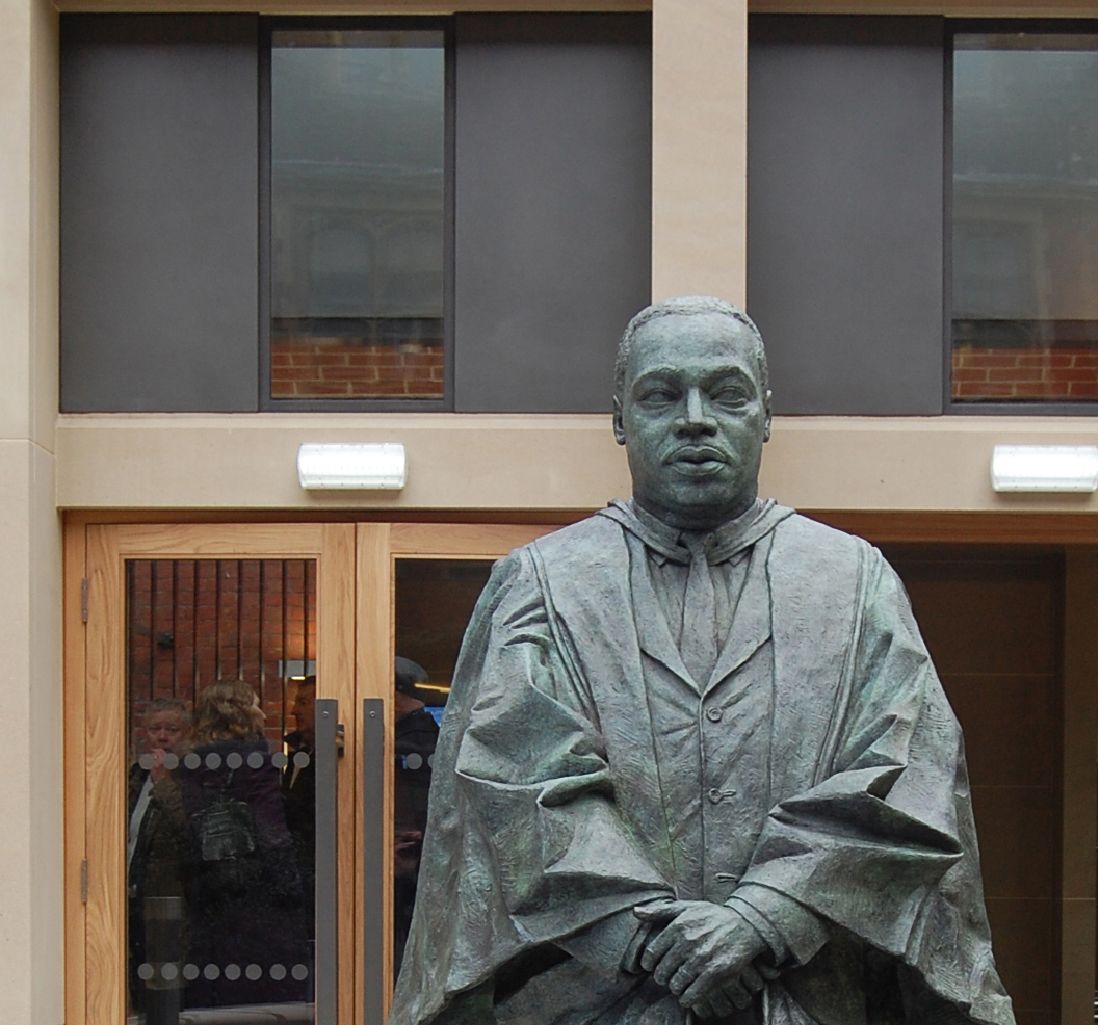
Learn More
Newcastle University Library Special Collections & Archives collects, preserves, promotes and provides access to rare or unique and distinctive books and archives. These resources are made available not only to our own University staff and students, but to researchers from other institutions and to the wider community.
To find out more about our holdings please look at our Collections Guide. To discover how you can consult materials see Using our Collections.
This digital exhibition was brought to you by Newcastle University Library Special Collections & Archives, based on an exhibition co-curated with Professor Brian Ward and with support from Freedom City 2017, a programme which brought together international artists, musicians, film-makers, academics and community groups to inspire a new generation to contribute towards tackling the issues that Dr King spoke of in his acceptance speech.

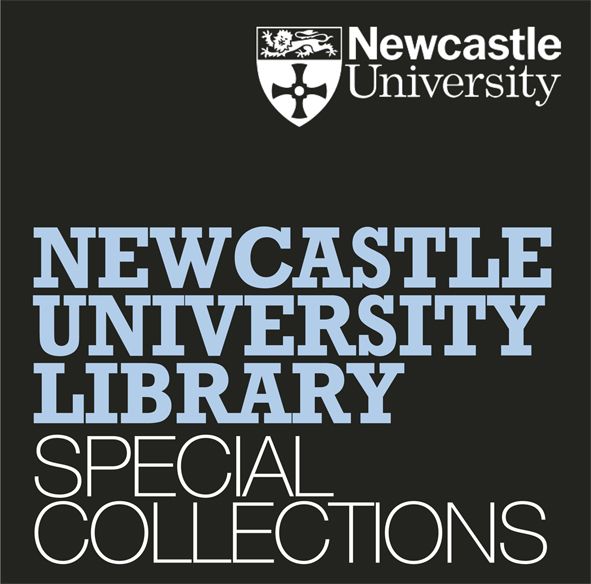
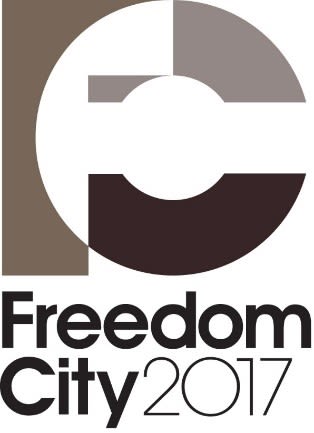
![[Lord] Wynne-Jones, letter to E.M. Bettenson, October 2, 1966](./assets/akxM1lsz7l/nua-00-7621-4-30-500x700.png)
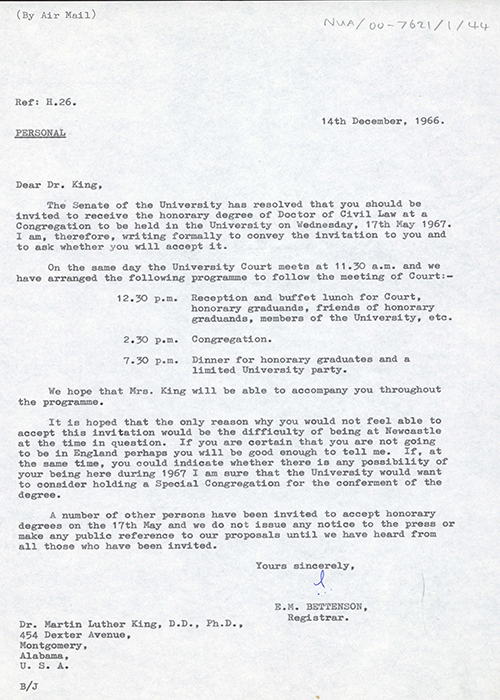
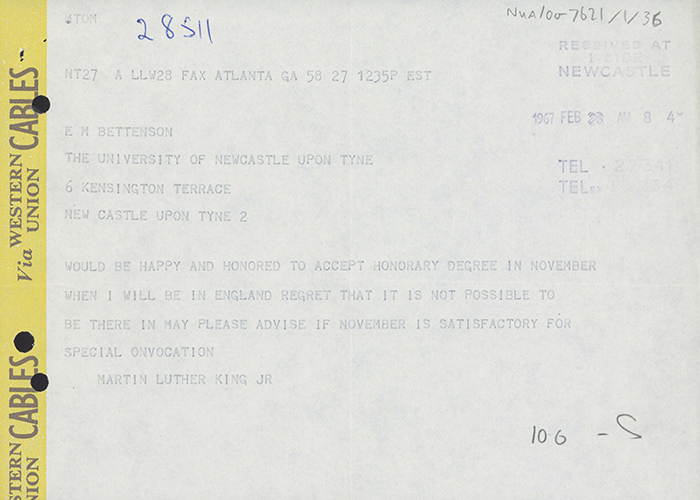
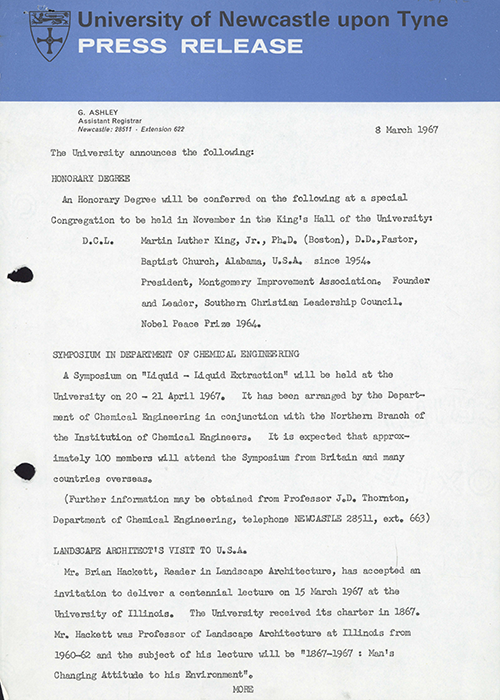
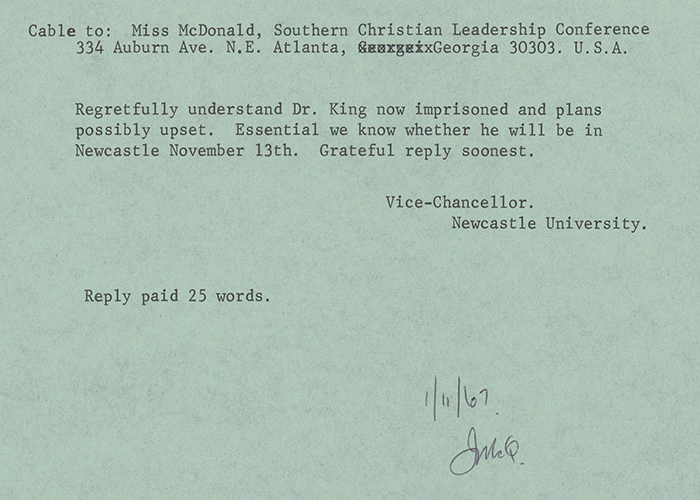
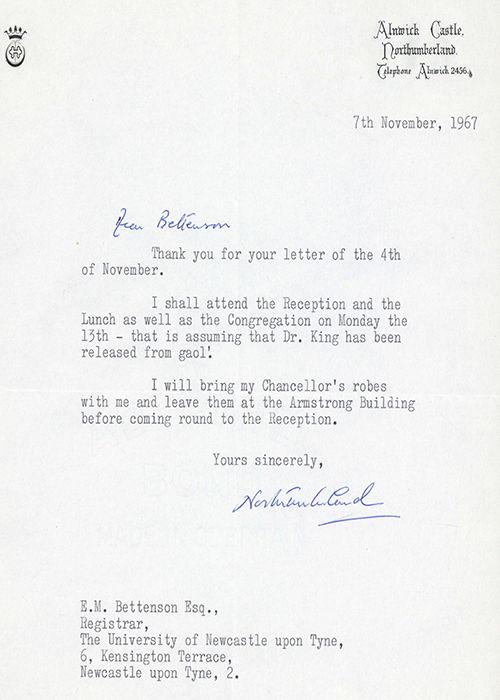
![[George Howe], Page 1 of notes for Mr. Saunders at Marchals briefing at 1.45pm on Monday 13th November 1967, undated](./assets/HRfeav50Mb/nua-00-7621-2-19-1-487x700.png)
